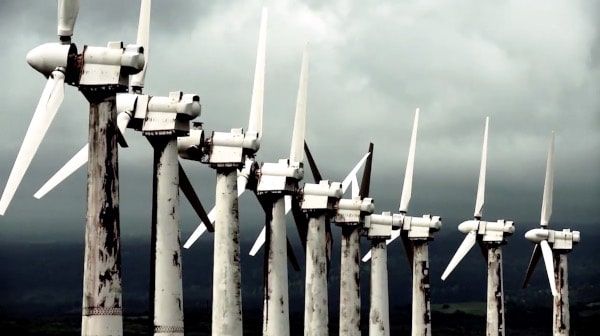Eye For Film >> Movies >> Planet Of The Humans (2020) Film Review
Planet Of The Humans
Reviewed by: Jennie Kermode

It's hard to think of a more interesting time to consider a film about energy production and climate crisis than just after the global oil price has dropped into the negative for the first time in almost two decades. As millions of factories lie idle around the planet and habitual shoppers under lockdown are forced to rethink what's essential, Jeff Gibbs' documentary about the devastating effects of overconsumption and the myth of easy salvation through renewables may lead some to question whether or not going back to normal is a laudable aim.
Executive produced by Michael Moore, with whom Gibbs has worked on a number of previous projects, the film is being released amid heavy fanfare just ahead of the 50th anniversary of Earth Day. Like many of Moore's works, it suffers from being too narrowly focused and overly didactic - this is a huge subject and impossible to cover all of in just 96 minutes, but viewers could too easily go away with the impression that there's no more to be said. It's tough going, lacking the inclination to playfulness that leavens Moore's work, but Gibbs is in many ways a better director and the film benefits from lively editing that keeps it visually interesting. He also possesses that quality that gave Moore great popular appeal - he's passionate about what he has to say.

This is a very personal story for Gibbs, who has supported environmentalist causes for most of his life and shares the frustration of many experts in the field who continue to watch things fall apart despite decades of warnings. A strong opening sequence presents vox pops with members of the public who speculate on how long the human species has left, their responses ranging from "infinity" to "10 to 15 years." It's not difficult to illustrate which of these is likely to be more accurate, and Gibbs is careful not to waste too much time telling viewers things that they already know (because let's face it: if you were comfortably in the former camp, you probably wouldn't be watching in the first place. the bulk of the film is dedicated to something that gets far less media attention: the shortcomings of proposed solutions.
Principally, Gibbs is concerned with the ways in which the wind and solar energy industries fall short of providing the clean solution most people believe them to represent. He looks at issues like land clearance, manufacture of materials, and the environmental damage these do, as well as the way that renewables projects are used as window dressing by corporations still heavily invested in fossil fuels and the way that fossil fuel is used to support many supposedly 'clean' energy projects. There's much here that viewers are likely to find shocking, and Gibbs support his arguments with a fair quantity of facts and figures as well as some wonderfully uncomfortable interview material.
Some ground is left uncovered - his tendency to focus on big players means that the apparent success of many small independent projects which have sought to avoid these compromises goes unaddressed, as does the question of whether or not reduction is worth striving for even if perfection is out of reach (though he does demonstrate that some 'green' projects have actually made the problems worse). Perhaps most bizarrely, nuclear energy isn't mentioned at all. In as far as it goes, however, this is a strong introduction to a topic which viewers can then go on to explore more widely, and it doesn't shy away from exploring the way that politicians and other prominent figures have exploited the idea that everything will be okay if only people spend more money on something else.
What's more difficult to discern here is what Gibbs hopes to gain from making this argument. He stresses his belief that the most important thing is for people to be more aware of what's going on, but it's unclear how this awareness is supposed to help. Many viewers are likely to be left feeling hopeless and apathetic; there is no reflection on the very simple things they could be doing, largely outside the framework of consumerism, to mitigate the situation.
Also problematic is the way that Gibbs addresses the issue of overpopulation with barely a reference (and those only from other speakers) to issues of climate justice and the problems that stem from uneven wealth distribution, or even to practical solutions like investment in contraception or educating girls. This is a very well composed rant but little more than that, and though Gibbs' anger is understandable, his despairing rhetoric seems unlikely to help. Assorted scientists working on environmental issues make vague references to human nature and to humans only being animals in a way that overlooks (as so often) the existence of decades' worth of research by political scientists, anthropologists and sociologists into how human societies can be prompted to change and adapt.
If you look at the state of the world and feel nothing but despair, Gibbs' film may afford you the dubious pleasure of getting to believe you were right. If not, you may find the gaps in the story it tells as frustrating as the rest is educational.
Reviewed on: 21 Apr 2020

















